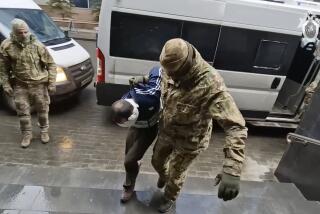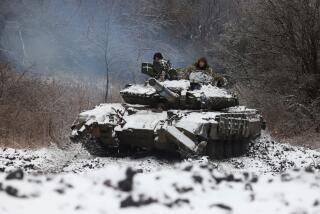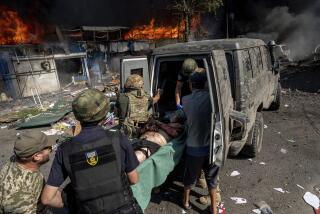Moscow Juggles Conflicts in Former Soviet Territory : Russia: An accord brokered in Iran may have defused hostilities in Tajikistan. Two enclaves in Caucasus Mountains remain hot spots.
- Share via
MOSCOW — As the United States threatened to invade Haiti, Russia was busy in its own southern yard Saturday, arranging a cease-fire in one guerrilla war, covertly meddling in another and scrambling to prevent an old one from reigniting.
All three conflicts--in the former Soviet Central Asian republic of Tajikistan and the Caucasus Mountain enclaves of Chechnya and Abkhazia--have been simmering since the end of the Cold War, challenging Russia and its army for nearly as long as Haiti’s dictatorship has defied Washington.
Struggling to control events throughout the former Soviet Union, the Russians last week found all three fronts heating up at once.
On Saturday, they apparently managed to defuse the biggest conflict, helping forge a cease-fire between Tajikistan’s Moscow-backed government and the guerrilla-led opposition after two years of fighting and 20,000 deaths.
The accord, signed in Tehran and reported by Russian news agencies, is to take effect as soon as international observers are deployed in Tajikistan. The two sides agreed to exchange hundreds of prisoners and to continue talks aimed at getting the Tajik opposition, a loose alliance of democrats and Islamic fundamentalists, to take part in presidential elections Nov. 6.
Arguing the need to stop the spread of Islam, Russia ordered its troops to drive the Tajik alliance from power in October, 1992, and install a clan of former Communists. The troops, now numbering 25,000, then stayed to fight off the opposition’s guerrilla attacks, launched mostly from Afghanistan.
But the Russian intervention has been controversial at home because of Tajik leader Imomali Rakhmonov’s dictatorial rule and growing casualties suffered by the Russian army. Fighting intensified last week, and four Russian border guards died Friday in a land-mine explosion.
Seeking a way out, Russia’s Foreign Ministry pressed Rakhmonov early this month to postpone the elections, originally set for next Sunday, and to send his top deputy to the peace talks in Tehran, which were mediated by U.N. officials with Russian and Iranian assistance.
Under the agreement reported Saturday, U.N. observers will supervise a Russian-led peacekeeping force.
In similar fashion, Russia took sides last year in ethnic conflicts in the former Soviet republics of Azerbaijan and Georgia only to reappear as a peacemaker. But the conflict in Georgia’s Abkhazia region threatened last week to flare anew.
Abkhazia, an ethnically distinct Black Sea enclave, won de facto independence from Georgia a year ago after 13 months of war. After covertly backing the Abkhazians, Russia arranged a cease-fire and sent 2,500 peacekeeping troops to the Abkhazia-Georgia border in May.
But last week, Russia provoked a conflict by siding with Georgia. Bypassing the Abkhazians and the U.N. refugee officials, Russia and Georgia agreed to start a wholesale repatriation of 250,000 ethnic Georgians who had fled Abkhazia during the war.
Abkhazia, which wants to limit the refugees’ return until Georgia recognizes its independence, responded by sending 3,000 militiamen to the border. The Russians called off the repatriation, but not before some of their troops had abandoned their posts to the armed Abkhazians.
Russian President Boris N. Yeltsin sent Defense Minister Pavel S. Grachev to Abkhazia to settle the dispute over refugees and save the peace mission. Grachev met there Friday with Abkhazian leader Vladislav Ardzinba and Georgian leader Eduard A. Shevardnadze. It was Shevardnadze’s first trip to Abkhazia since he fled a year ago on a plane full of defeated and wounded Georgian soldiers.
Yeltsin and the Russian army have asserted the right to station troops across the former Soviet Union and to intervene in conflicts. Officials in the West, wary that Russian meddling might cause more conflict than it prevents, view the peace mission in Abkhazia as a test case.
Before briefing Yeltsin on his talks, Grachev announced Saturday that the two sides had agreed on a tentative plan to repatriate refugees in exchange for the withdrawal of Georgian military equipment from the region. He gave no details.
Some officials in the region believe the Russians are trying to manipulate the flow of refugees to keep Abkhazia from intervening militarily in nearby Chechnya, an oil-rich Muslim republic that is part of Russia, on behalf of its separatist leader, Gen. Dzhokar Dudayev.
Prompted by Chechen terrorist attacks on passenger buses in another part of Russia, Moscow has been trying since early August to topple Dudayev by sealing off his borders with troops and arming a recently formed Opposition Council.
But the emboldened opposition has made little headway in sporadic armed clashes. On Saturday, news agencies reported from Chechnya that Dudayev’s forces had advanced on an opposition stronghold 12 miles from the Chechen capital but halted after a brief skirmish. One report said that two people were killed.
Times special correspondent Chris Bird contributed to this report from Zugdidi, Georgia.
More to Read
Sign up for Essential California
The most important California stories and recommendations in your inbox every morning.
You may occasionally receive promotional content from the Los Angeles Times.










